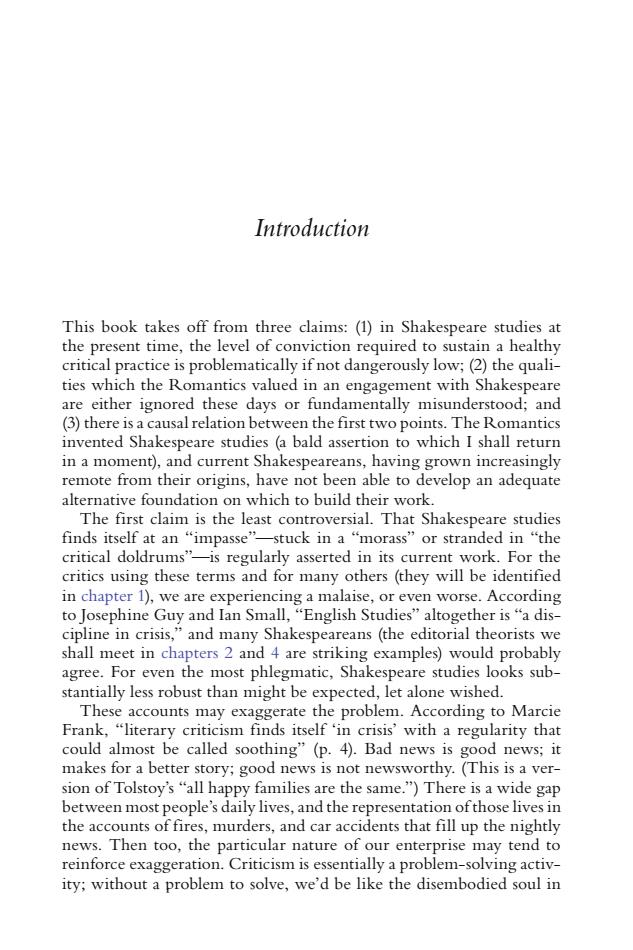正在加载图片...

Introduction This book takes off from three claims:(1)in Shakespeare studies at the present time,the level of conviction required to sustain a healthy critical practice is problematically if not dangerously low;(2)the quali- ties which the Romantics valued in an engagement with Shakespeare are either ignored these days or fundamentally misunderstood;and (3)there is a causal relation between the first two points.The Romantics invented Shakespeare studies(a bald assertion to which I shall return in a moment),and current Shakespeareans,having grown increasingly remote from their origins,have not been able to develop an adequate alternative foundation on which to build their work. The first claim is the least controversial.That Shakespeare studies finds itself at an“impasse”--stuck in a“morass”or stranded in“the critical doldrums"-is regularly asserted in its current work.For the critics using these terms and for many others(they will be identified in chapter 1),we are experiencing a malaise,or even worse.According to Josephine Guy and Ian Small,"English Studies"altogether is"a dis- cipline in crisis,"and many Shakespeareans(the editorial theorists we shall meet in chapters 2 and 4 are striking examples)would probably agree.For even the most phlegmatic,Shakespeare studies looks sub- stantially less robust than might be expected,let alone wished. These accounts may exaggerate the problem.According to Marcie Frank,"literary criticism finds itself'in crisis'with a regularity that could almost be called soothing"(p.4).Bad news is good news;it makes for a better story;good news is not newsworthy.(This is a ver- sion of Tolstoy's"all happy families are the same.")There is a wide gap between most people's daily lives,and the representation of those lives in the accounts of fires,murders,and car accidents that fill up the nightly news.Then too,the particular nature of our enterprise may tend to reinforce exaggeration.Criticism is essentially a problem-solving activ- ity;without a problem to solve,we'd be like the disembodied soul inIntroduction This book takes off from three claims: (1) in Shakespeare studies at the present time, the level of conviction required to sustain a healthy critical practice is problematically if not dangerously low; (2) the qualities which the Romantics valued in an engagement with Shakespeare are either ignored these days or fundamentally misunderstood; and (3) there is a causal relation between the first two points. The Romantics invented Shakespeare studies (a bald assertion to which I shall return in a moment), and current Shakespeareans, having grown increasingly remote from their origins, have not been able to develop an adequate alternative foundation on which to build their work. The first claim is the least controversial. That Shakespeare studies finds itself at an “impasse”—stuck in a “morass” or stranded in “the critical doldrums”—is regularly asserted in its current work. For the critics using these terms and for many others (they will be identified in chapter 1), we are experiencing a malaise, or even worse. According to Josephine Guy and Ian Small, “English Studies” altogether is “a discipline in crisis,” and many Shakespeareans (the editorial theorists we shall meet in chapters 2 and 4 are striking examples) would probably agree. For even the most phlegmatic, Shakespeare studies looks substantially less robust than might be expected, let alone wished. These accounts may exaggerate the problem. According to Marcie Frank, “literary criticism finds itself ‘in crisis’ with a regularity that could almost be called soothing” (p. 4). Bad news is good news; it makes for a better story; good news is not newsworthy. (This is a version of Tolstoy’s “all happy families are the same.”) There is a wide gap between most people’s daily lives, and the representation of those lives in the accounts of fires, murders, and car accidents that fill up the nightly news. Then too, the particular nature of our enterprise may tend to reinforce exaggeration. Criticism is essentially a problem-solving activity; without a problem to solve, we’d be like the disembodied soul in ity; without a problem to solve, we’d be like the disembodied soul in